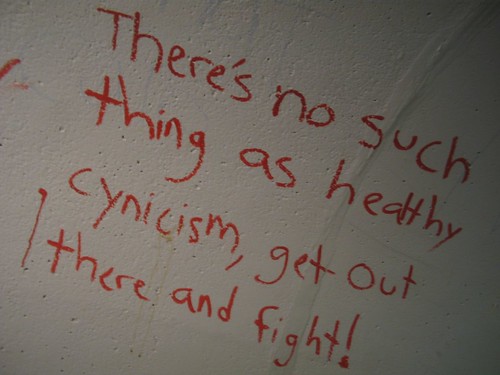My last post talked about applying the rules of improv to how we behave as technical artists in the church. Since then, I have thought more about the idea of cynicism and negative responses.
It is so easy to get cynical and negative, as the things that I care about are undermined or disregarded or misunderstood. As an unusual bunch, it can be easy for us technical artists to feel these things; to become disillusioned with where we are and what is happening. It can really easy to let the cynicism get the better of us and drive us to become bitter people. Here are a couple of my own observations as it pertains to doing production in the local church.
God doesn’t call us to be negative and cynical. I believe it is OK for us to be disappointed in how things go, or wish that the process were better, but to live in a passive aggressive state because you are misunderstood or that nobody cares doesn’t help anyone, especially you. If you are frustrated with the process, channel that frustration into positive action: what am I doing that is making the process difficult? What is something I have control over that we can change to make the process more smooth? How can I communicate differently so that the production perspective is better understood?
Being passive aggressive is not the abundant life. In John 10:10, Jesus says: “The thief comes only to steal and kill and destroy; I have come that they may have life, and have it to the full.” Satan has a field day with church tech people when we give into our cynicism. Christ didn’t come so that we could wallow in that type of living. He came so that we could have an abundant life that is way better than whatever version of “tech person cynic” you are living.
You are not a part of the body of Christ so you can complain all the time. As tech people, we look at the world from a different perspective, which is necessary for the church to function properly. However, always complaining about how leadership doesn’t understand, or how undervalued production is, or complaining to your volunteer teams that the pastor’s last minute graphics are stupid and evil, isn’t what God designed our role to look like. If things aren’t right, do something about them, don’t just sit in the back of the room and throw stones. If you have given it some effort and things haven’t changed, perhaps you should move on.
How are you letting cynicism get the better of you? How can you channel your frustration into positive momentum instead of letting it drive you to being passive and aggressive?










